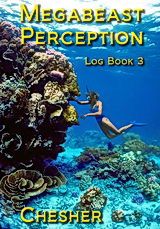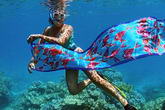THE WATERSHED OF EVOLUTION
Picnic Day. Off into the countryside with Megan and John Archer and Robert Strachan. They are waiting for us at the foot of the wharf as Freddy and I zoom in with the Avon and tie up. We pile into their car and head off in high spirits. Megan and John are young medical doctors just starting their practice here. Robert is a young, tall, lanky American artist who has immigrated to Australia. We met them through Lee and Janet Lafferty, also American immigrants.
John drives us through Cairns and out into the sugarcane farms of the coastal plane. After a couple of hours, the sugarcane fields give way to the steep slopes leading up to the massive inland plateau known as the tablelands. We start up the foothills and the hot, sultry air of the lowlands begins to cool. Lush forests engulf us.
John slows and turns off onto a small side road with a prominent sign saying "keep out." The dirt road trails through to the river where Cairns gets its water supply. It peters out in the forest. Everyone unlimbers from the car and we walk through the forest, smelling the cool green life, hearing the gurgling of the river nearby, lugging the beer and baskets of food. Eventually the forest ends and we stand before a series of cascades and glimmering pools of crystal clear water.
"I love mountain rivers," I shout. Nobody hears me through the roar of the river.
The procession continues up to the most spectacular cascades and there, amid the solid white noise of the foaming water we set up base and split up to wander over the glistening black rocks - isolated in our thoughts by the thundering river.
My thoughts turn to evolution and behavior. Human evolution. What role does genetics play in human behavior? What about Character traits, are these genetically determined? An urge to fight, a hot temper, a probing curiosity, a fear of the unknown, a love of territory, strong sexual drives, leadership, followership, faith. What of the ectomorph, endomorph, mesomorph human types? Are these phenotypes of genetic behavior patterns?
I leap from one sun warmed rock to the next, out into the middle of the rapids. Questions tumble through my head to the rumble music of the river. How can we examine or even think about human evolution and behavior on a population basis over geological ages?
I play with geologic time in my mind. The rocks become evolution's canvas and the white rushing water time's paint brush. In the color, symmetry, and balance of the two the story of evolution unfolds.
The river is a behavioral event created by myriad environmental conditions
ranging from the relationship of the planet to the sun, to the relative hardness of the
minerals in the rocks. This is using behavior in a very broad meaning - the interaction
between two or more .... two or more what? Things? Beings? Entities?
What is a river? A thing? Is a river bed an object? Standing here looking at river and rock I discover a big deficit in my language. Something wrong there.
"A river is a process, not a thing," says my inner voice.
I step to another rock and my inner voice emerges from the white noise of the water coursing over the rocks.
"Behavior" Inner Voice pontificates, "is the key to evolution. But you must think of behavior in terms of collective behavior - the behavior of systems, of populations, super-organisms."
Voice and I clamber onto an enormous gray bolder to admire a lovely little waterfall. In the mist and movement of the falling water, a rainbow shimmers clear sunlight into purple, red, orange, yellow, green blue, violet. The rainbow washes my soul.
Inner Voice uses the rainbow to illustrate the concept of populations behaving. Within the rainbowed waters, Inner Voice produces a visual array of super-organisms interacting, forming larger, complex beings. I see bees hiving, ants marching, termites nesting and thousands of humans crystallizing cities - Hong Kong, New York, San Francisco, Taipei.
Somewhere in the mesmeric cascade of human industry reflected in the rainbow Voice says something else. I'm not paying attention and only catch the words "compound genetic behavior, the genetics of superorganism behavior."
"What?" I ask, feeling relaxed and sleepy.
Voice is pissed off because I wasn't paying attention. I can feel its frustration as I let my mind simply admire the beauty of the river and watch my friends over there on the shore set up the picnic, get undressed and jump into the cool river.
Robert is climbing the rock face of the cliff right next to the largest, most impressive waterfall. It looks very slippery and he looks very small up there.
Voice ahems at me and I discover myself looking at the river-smoothed boulders and seeing/thinking their evolution. This is a nifty trick so I pay attention again.
Built into the rocks are patterns formed - frozen - at the instant they solidified. I see them molten - gushing out of a flaming Earth - freezing into these wonderful swirls and layers.
As
liquid rock, their destiny is fluid, uncertain, flexible in the extreme. Once they emerge
from the molten Earth and cool, their form is fixed and rigid.
In this, the rocks are like human population control systems. Population behavior systems - such as customs and traditions - emerge from a fluid background of human behavior. Environmental conditions and events solidify population behavior into rigid customs or traditions.
Like the rocks, tradition and culture determine the course of the individual human lives which flow past them. As the course of individual human lives collectively alters, so the river of human history bends and twists through the rocky watershed of hominid evolution, eroding and shaping the entire mountain of life on Earth.
The rocks of tradition slowly weather and change, but their elements, their basic patterns and their position in the river bed remain through the course of a multitude of human generations.
Perhaps, once and a great while, during a violent behavioral storm, flood waters carry a larger revolutionary rock bounding down the river and this might crash into some of the traditions and crack them or move them or even block them off so they no longer influence the flow of humanity. But, in general, the massive behavioral rocks of tradition determine the course of human evolution.
I am confused by this river metaphor and ask Voice how it works.
Are the molecules of the rocks words or actions? Are the rocks something like the equivalent of population genes altering the genetic structure of the flow of human evolution? Or what?
Voice replies in an exasperated sigh, "Don't worry about the geology of the rock, its molecular makeup and inner stresses. The rock alters the path of the water and forms the fluid into small wrinkles and folds extending out into the medium itself - see how the ripples, created by the impact of water with the rock remain dancing in place while the slippery molecular mass of water slides swiftly by? Concentrate on the color, balance, symmetry of these waves. How do they form? What is the relation between the standing waves, the river water and the rock? This is what you must penetrate and understand."
I
am, however, suddenly more interested in Voice
than what it is saying.
Here I am standing on this big rock in the middle of these river rapids listening to some inner voice lecture about evolution, seeing a series of visions from some inner eye illustrating Voice's lecture by overlaying concepts onto what I am actually seeing with my eyes. This is weird stuff.
I must be doing this - I am doing this - but why bother to invent Voice when I can just think about these things directly? Very weird.
Ever have a feeling of being watched and turn around and sure enough, somebody is watching you? There is an instant of bright fear that lances through just then. Well, when Voice stops lecturing me, I get a feeling just like that.
There is a moment of stunned inner silence when the two of "us" regard each other. Voice, at that instant, is as real and shocking as if I had suddenly turned around and seen Merlin the Magician pontificating in my ear.
Voice echoes my alarm, as if I'm not supposed to be aware of Voice, just listen. In that same instant, Voice is gone. It does not even say good by.
"Bye, have a good time. Don't forget to write," I say out loud into the river rumble.
Comfortably alone now, I walk the rocks mulling over what happened and wondering if Voice answered my original questions or not. I remember this all started with my asking about how much of human behavior is genetically determined. Strangely, I can't quite remember what Voice just said. Worse, I get the feeling I didn't actually understand what it was trying to say. Like Voice was an order of magnitude smarter that I am and was patiently trying to tell me something important.
On my own, I think of population behavior patterns and genetics. OK. Extrovert-Introvert. There must be a population curve - a gaussian distribution - ranging from super introvert to super extrovert. Most people are in the middle of the large bell-shaped curve. A smaller percentage are very introverted or very extroverted. Introvert-Extrovert behavior is the manifestation of a complex mixture of physical/psychological conditions, many controlled by genes.
The Introvert/Extrovert ratio changes for any particular individual from one time to another and from one set of conditions to another. So there must also be a bell-shaped curve representing individual introvert-extrovert behavior at different times.
There will be times when each person is super introvert or super extrovert but most of the time a person oscillates somewhere in the big bell region. This is controlled by ambient environmental conditions as they interact with genetic predisposition.
I jump to the next river rock.
What about sex? Sex is definitely genetically determined. But sexual behavior varies considerably from super sexy to super unsexy. In animal populations males vary from the alpha-male superstud to the neuter male which never breeds. I can think of lots of examples of similar human behavior.
I clamber up a small stream and come upon a clear pool of water. Freddy is swimming stark naked in it. Evolution recedes rapidly into the distance as I shuck off my bathing suit and leap into the icy water.
It is late at night and Freddy has already gone to bed. I can't help wonder about the odd feelings I had today. Specifically, the sensation of the Inner Voice as something actually different from me.
This is not exactly the glittering image of mental health. On the other hand, those Rudolph Steiner exercises were aimed at developing just this sort of inner voice - a mystical guide - so maybe it's not all that bad. At least I don't have to put up with Steiner's angels and demons lurking around in my gray-matter.
Inner Voice seems to understand the evolutionary process in a way I don't. Even worse, it tries to explain it to me but, to be honest, I don't understand what Inner Voice is trying to say. I also don't really know why the hell it should be trying to tell me anything at all about evolution in the first place.
Why should evolution bug me?
"Because it represents long term control vectors modifying behavioral networks."
There it is again. One part of me asks a question and out pops an answer.
OK, suppose I ask, "What is the key to evolution?"
"Behavior is the key to evolution. Lamarck's much discredited inheritance of acquired characteristics is true - for the population." Along with this answer, I get an illustrated mental example of the process. The image comes complete in visual form. It's going to take time to say it in words.
The image is about Darwin's famous Galapagos finches.
There is a small population of birds on a small island. There is not much for the birds to eat on this small, rocky, volcanic island. Times are tough. The birds arrived from South America, blown to this island during a storm. They are fruit-eaters. There are some fruits and seeds to sustain them at first but as their population increases, the fruits are not enough and the birds eat themselves out of a diet. As pressure to find food increases, the individual birds respond by:
1. Not eating anything and dying.
2. Eating something else and living.
Suppose, of a population of 2000 birds, 1000 keep on searching for fruit until most of them die while another 1000 begin to eat insects as well as fruit and these live. 100 of the surviving birds learn to look for insects under the bark of trees. Birds instruct their young, so at least some of the young of the birds that learned to look for insects under the bark of trees follow their parents hunting example.
This is fortunate because the other birds quickly gobble up visible insects large enough to form a useful diet. Only those insects living under the bark of trees survive the avian attack. So, only the birds which have learned to look under the bark of trees survive.
As this remaining bird population grows, it soon reduces the population of insects which live just under the bark of the trees until only the insects which live actually burrowed in the wood survive. Safe from the birds, these do well and there are many of them since they no longer have much competition of the sub-bark dwelling insects which are under constant attack by the birds.
After a couple of thousand years, some birds learn to peck vigorously at the wood under the bark to dig out the insects. These birds live long and prosper but the majority of the insect eating bird population has a hard time of it and many starve.
Of 1000, there is a bell-shaped curve of bill length. This bell shaped curve
ranges from birds with very short beaks to birds with long beaks.
Random genetic diversity determines the range of beak length. Birds with long, strong beaks peck out more insects than birds with shorter beaks and thus have a better chance of survival.
The offspring of birds with longer bills have genes for longer bills. Over a period of many generations, birds with long, strong bills evolve which know how to peck at wood and drill out insects and insect larvae for food.
But, and this is the key, there would be no advantage, no selection, for longer bills unless the birds were already trying to eat insects which lived under the bark of trees. The ancestral stock of fruit eating birds first had to attempt to survive on an alternate diet. This change in behavior created the selective advantage for a modified bill, perfectly suited to pecking wood for insects.
In an evolutionary sequence, a change in behavior must precede the resulting physical change in form.
Behavioral changes, mental changes, new ideas come first. Physical evolutionary modifications follow. And behavior, aimed at survival, is not random.
This thought is somehow very exciting. I get up and pace back in forth in Moira's salon, ideas coming fast and furious.
Behavior evolves, too. Faster than form. Genes control animalistic, instinctive behavior, but maybe changing a behavioral gene is easier than changing a physical one. Perhaps behavioral genes are more flexible, have special circumstance overrides, or maybe they are actually a different kind of protein structure than those determining physical form.
Or maybe behavioral genes operating on a whole population are not protein based at all.
No. They are. Think of innate social behavior such as the mating call of the finch or its nest building behavior.
Walter the Cat pounces from under the dinette as I pace by and lands on my foot. He sinks his claws and teeth into my foot hard enough to draw blood. Then, propelled by my surprised scream, he races aft, spins around, crouches and laughs at me.
"Damn," I yell. "You've had it you furry freak."
"What happened" Freddy calls from the aft cabin.
"The little bastard bit me."
"Well, you don't want a drooly stupid cat do you?" her sleepy voice joins Walter, laughing.
"No but I don't want one which is mean, either." I say angrily, heading with deadly malace towards Walter. He's been getting unpredictably vicious - attacking when least expected like Kato in the Pink Panther movies. He's got something against feet.
"Oh leave him alone," Walter leaps up on the bed and Freddy pushes me off. "Go on with your thinking but maybe you shouldn't pace for awhile."
I go forward, sit down, tuck my feet up out of danger.
Species all exhibit different behavior patterns, especially sexual behavior patterns. In fact, sexual behavior patterns are what prevents closely related species from interbreeding. Sexual behavioral segregation in sub populations of a gene pool leads to genetic isolation and thus the creation of a new species.
Behavior - instinctive behavior - is a genetic memory system.
Walter Cat comes back into the main cabin and sits there looking at me. Sending some sort of telepathic message, eyes boring into me. "He wants to play," calls Freddy, more sensitive to Walter's message than I want to be.
"You play with him," I growl. Walter crouches down, then leaps up and swats my arm (softly) and bounces off. "He wants to play predator to my prey," Where was I? Oh right. Genetic systems are memory systems.
I start to correct myself and stop, and think. Well, wait a minute, that's right. Genetic systems are memory systems.
Human genetic systems are memory systems which know how to construct a human being. The genes are memories of how to make a tooth, a brain, a human eye. And when genes are read, recalled, they direct how humans use their bodies. Humans, when born, have a brain with memory banks as well as a behavioral system for the use of this equipment. We are born with the muscles to make a smile as well as the innate behavior which results in making a smile or frown or sneeze.
How much of our behavior is genetically determined and how much of our behavior is environmentally determined? Culture and tradition are the control systems to construct our genetic format as well as the stage and the circumstance upon which we act out our genetic predisposition.
We inherit our genes and our culture. The question is wrong. The whole argument about genetically determined versus environmentally determined is wrong. It's not like that at all. They are both manifestations of the same process.
I can almost see it. I can almost see something. Something important. Then it is gone, like a cloud passing in front of the moon stops the reflection of sunlight onto the planet.
Just before I go to sleep Voice returns and says one word. I've heard it before but am not exactly sure what it is or what it has to do with Evolution or anything else. The word is Mana. I tell Voice to piss off and go to sleep.




